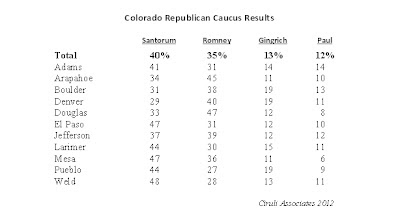The Rick Santorum sweep of three states on February 7 changed the direction of the presidential race. The Colorado win was “a major upset.”
“This time, ‘losing one of these races is not game-changing,’ said Floyd Ciruli, a Denver-based independent political consultant. ‘But it would be a lifeline for one of the other candidates.’” Miami Herald, 2-6-12
But losing three and “definitely, there is a new story now.” Denver Post, 2-7-12
The following examines the Colorado caucuses results and provides analysis showing that the Colorado Republican Party has a new nominating majority that can defeat the party establishment.
1. Santorum carried most of rural Colorado, especially the High Plains. He won the large counties that delivered for the Tea Party Movement candidates in 2010: Adams (41%), El Paso (47%), Larimer (44%), Mesa (47%), Pueblo (44%) and Weld (48%).
“This harkens back to 2010, when the Tea Party essentially upset the established Republican candidates for the Colorado governor and Senate races, and it clearly demonstrates that the grass roots of the party remains very conservative and is unwilling to unite behind the presumptive frontrunner,” Ciruli said. Denver Post, 2-7-12
2. Santorum came to Colorado repeatedly while Mitt Romney and Newt Gingrich were battling in Florida and Nevada.
“Santorum played it smart, Ciruli said. While Romney and challenger Newt Gingrich exchanged expensive blows before the Florida primary, Santorum went to Colorado and the Midwest to appeal to the conservative arm in the Republican Party. He targeted the three states that would likely have low turnouts and had large numbers of enthusiastic and conservative voters, Ciruli said.” Denver Post, 2-7-12
“Floyd Ciruli, a Denver-based political analyst, said while the other candidates were focused on Nevada's caucus last weekend (where Romney easily won and Santorum came in a distant last), Santorum was attending a Lincoln Day Dinner in tea party-friendly Weld County, Colo., and drawing a record crowd. Also, Ciruli said, Romney seemed to take Colorado for granted.” Morning Call Washington Bureau, 2-8-12
3. Turnout, while slightly below 2008, was dominated by Santorum’s conservatives.
70,000 caucus attendees in 2008 – Romney 60%
66,000 caucus attendees in 2012 – Santorum 40%
4. Conservatives want to win the general election, but were not willing to endorse the candidate labeled as the “establishment moderate” and not convinced a lack of sharp contrast makes a winner.
“And Ciruli sees a deeper problem for Romney: GOP voters are rejecting him as the ‘establishment moderate.’
‘This is a party that desperately wants to win — that sees Obama as terribly dangerous,’ Ciruli said, ‘but they still are not willing to give their vote at this point to someone not filling their aspirations. They’re just not willing to do that.’” Morning Call Washington Bureau, 2-8-12
5. Romney won Colorado by 60 percent in 2008 against John McCain. But, he was positioned as the more conservative candidate. The last poll before this primary had Romney with 40 percent to Santorum’s 26 percent, but robo polls have difficulty identifying caucus attendees.
“9NEWS political analysts have said our state could weed out a bottom contender, and perhaps set the pace for the rest of the western United States.
Even though Mitt Romney won Colorado in 2008 with 60 percent of the vote, this time 9NEWS Political analyst Floyd Ciruli says it’s not in the bag for Romney.
‘He’s going to have some concern about the fact that he is now seen as the more moderate person - four years ago was the conservative against John McCain so he’s seen as the more moderate person against this array of conservatives,’ Ciruli said.” 9News, 2-5-12
6. The Santorum victory reflects vulnerability for the party. He will have a significant challenge attracting moderates and independents that control winning Colorado’s statewide votes.
“‘It shows Colorado remains the model out there for the Republicans for the challenges that they face. They are trying to find a candidate who can appeal to both the conservatives in the party and the independent voters,’ Ciruli said.” Denver Post, 2-7-12
The Colorado caucus results were a major upset and changed the game. The Republican nominee may still be Romney, but it will require a long slog.
See articles:















